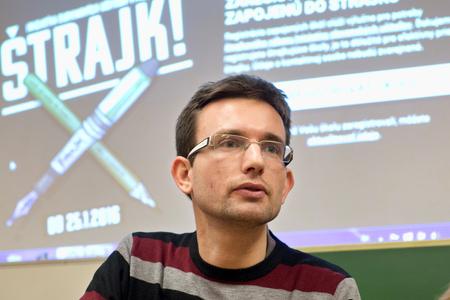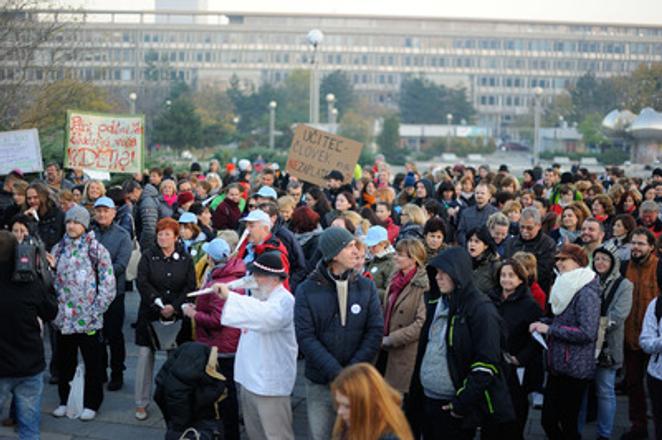Hundreds of nurses’ termination notices are still in place and the hospitals might face severe difficulties replacing those whose notices become effective in February. At the same time, teachers have been protesting since 2012, and their activities gradually increased towards the end of 2015, when they rallied in Bratislava and organised a “babysitting day”, when they refrained from teaching but stayed in classrooms.
On January 11 the teachers’ representatives announced they were going on strike alert and were ready to go on full strike on January 25.
“We decided on this step because the education minister [Juraj Draxler] repeatedly acknowledged that our demands were justified, but neither he, nor the government have carried out any concrete steps in order to meet them,” said Viktor Križo of the Slovak Teachers’ Initiative (ISU) as cited by the TASR newswire.

ISU is an organisation that originated after the merging of local teachers’ initiatives from all over Slovakia.
Their requirements connected with the announced strike alert are largely the same as those that the Slovak Teachers Chamber (SKU) addressed to the Government in October: salary increases for all teaching and professional employees in regional education facilities of €140 per month this year and €90 per month at the beginning of 2017, increasing the budgets of of the Education Ministry and the Interior Ministry for 2016 by €400 million in order to tackle current differences in school facilities.
Politically charged protests
Since the announcement of the strike alert, the topic has become a part of the campaign for the March general election.
It started with Education Minister Juraj Draxler charging that the strike alert is an “unambiguously political action”, with the argument that one of the teachers representatives, Miroslav Sopko of the Slovak Teachers Chamber (SKU), is running on the slate of the opposition Ordinary People and Independent Personalities (OĽaNO). Sopko, who is number nine on the OĽaNO slate, is however not involved in the organisation of the strike.
Draxler further argued that “one of the organisers is open about the fact that the purpose of this initiative is to lower Smer’s voter support”, as quoted by the TASR newswire. He referred to a statement of Ľudovít Sebelédi, head of the New Schools Unions (NŠO), from an interview in the Denník N daily.
Matovič vs. Pellegrini
OĽaNO leader Igor Matovič promptly convened a press briefing on January 13 and accused government representatives of attempts to intimidate teachers, which he labeled “condemnable” .
“We think it's desirable for teachers to be interested in public affairs,” Matovič said as quoted by the TASR newswire. Teachers have waited for the government to fulfill its promises the whole election term and now they have spoken “and they are fully entitled to do so”.
The number one candidate on the OĽaNO slate, anti-corruption activist and blogger Veronika Remišová, noted that the government has been stating for a long time that it did not have money for better salaries of teachers, but recently they spent tens of millions of euros “for useless project with questionable added value”, she said about the agreement on the updating of digital study documents worth €20 million that the government passed before Christmas, TASR wrote.
Parliament’s Speaker Peter Pellegrini responded immediately by accusing Matovič of being a co-organiser and supporter of the strike “in an effort to take advantage of teachers to boost his election campaign”, TASR wrote.
Pellegrini also rejected any recriminations directed against him over allegedly engaging in intimidation of teachers, but stressed that he sees his role as the parliament speaker to warn teachers not to trust politicians who want to abuse the strike for politicking.
Nurses’ protests faced similar accusations
The teachers’ strike is not the first recent protest action to face the accusation of being politicised.
In November 2015, when nurses started filing their notices to show their dissatisfaction about the way the Health Ministry has handled their demands of better pay and better working conditions, Health Minister Viliam Čislák said that the mass resignations are politically motivated. He argued with the reports that the Nurses and Midwives Labour Union head Monika Kavecká was considering running for parliament in the March 2016 elections.
Kavecká first confirmed such ambitions, but stressed that her decision only follows “the years-long ignoring of our demands”, as reported by TASR. On December 3 she however announced she would not run, in order to stop suspicions of political motivation of the protests.



 Teachers protested in Bratislava in November 2015. (source: SITA)
Teachers protested in Bratislava in November 2015. (source: SITA)